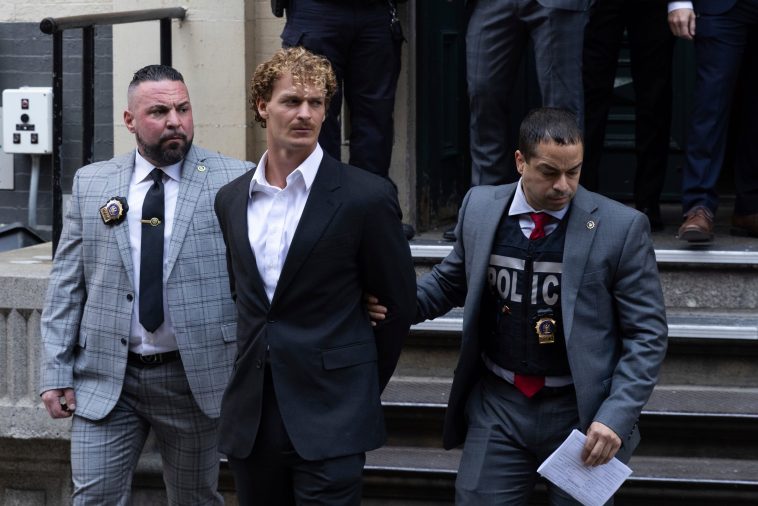This week, a jury will judge the fate of an ex-Marine confronted with accusations that his actions resulted in the death of a homeless man on a train. The charged offense, claimed against the 24-year-old veteran, could warrant a prison sentence of 19 years. The incident occurred on May 1, 2023, in a New York City train car involving a heated altercation with Jordan Neely, a 30-year-old man who was known for his impersonations of Michael Jackson.
The narrative unfolds with Neely, who happened to be homeless, launching into an uncontrolled tirade on the train. Eyewitnesses shared testimony depicting Neely’s erratic behavior, underscored by wild screaming and outright threats to passengers. Reacting to these chaotic circumstances, the ex-Marine, referred to as Penny, restrained a writhing Neely using a chokehold maneuver, maintaining this hold for six minutes until Neely fell unconscious.
Emergency medical services promptly transported an unconscious Neely to the hospital. However, upon arrival, medical personnel declared him deceased. Following the incident, Penny, maintaining his innocence, voluntarily entered a plea of ‘not guilty’ for second-degree manslaughter and criminally negligent homicide in quick response to the charges imposed on him.
His legal support sought to have these charges dismissed earlier in the year without success. Now, a jury trial scheduled for October 21 is set to examine Penny’s defense, arguing that his actions were a necessary response to an intensely threatening scenario. The crux of their argument positions Penny as a defender, not only of his own life but also of his fellow passengers, against Neely’s malicious actions.
The defense’s argument draws upon the context of increasing subway attacks and various crimes which have instilled a sense of need for self-defense among subway users over the past two years. Neely’s personal history is complex, having faced challenging battles with mental health issues in the years preceding this tragic incident, indeed complicating this case.
Public opinion is sharply divided over this issue. Some perceive Penny’s actions as heroically protective, placing the safety of himself and his fellow passengers first. However, another faction interprets this event as a clear incidence of excessive and unwarranted force, tragically enacted on a homeless, mentally ill Black man.
In a twist to this ongoing saga, a couple who might have testimonial evidence have elected not to testify or share any video footage of the incident. Despite the judge’s disclosure in September that they had chosen not to testify in the Grand Jury, they have thus far resisted all requests to share their filmed material or to contribute further testimony.
Their refusal persists, even when the requests come from the District Attorney’s office. They persistently decline to share the recorded material and continuously refuse to return to provide testimony, thus leaving a potential gap in the gathered evidence relating to this case, confirmed by Manhattan Supreme Court Justice Maxwell Wiley.
Neely’s criminal history casts its shadow on this multifaceted case. A series of offenses committed on the New York City subway are documented in his file, painting a picture of a man involved in numerous violent assaults on fellow passengers. For instance, a significant occurrence in 2021 marks the assault of an elderly woman near the Bowery station in East Village.
The assault left lasting physical damage including a broken nose, a fractured orbital bone, and further pain-inducing injuries at the back of her head. The official complaint specified the woman’s injuries from the November 12 attack. As part of the fallout from this felony assault, Neely was compelled to enter a 15-month alternative-to-incarceration program as mandated by the Manhattan District Attorney’s Office.
Prior to the fatal incident, Neely was expected to reside in a treatment facility while also maintaining his sobriety. His record, spanning from January 2020 through August 2021, reveals additional instances of troublesome behavior. This included an exhibition of public indecency, a misdemeanor assault on a woman, and a contempt of court charge due to a restraining order violation.
Despite the severity of these offenses, each one of them was dismissed through negotiation. In an earlier incident back in June 2019, court records document Neely’s violent altercation with the 68-year-old Filemon Castillo Baltazar on a West 4th St. Station platform, located in Greenwich Village.
A month prior to the aforementioned attack, another incident records Neely landing a subsequent punch on a man, resulting in a broken nose. The striking correlation – Neely’s life terminated at the same subway station, Broadway-Lafayette, where this particular altercation took place.
Even though the prosecution has conceded to the fact that passenger fear can be attributed to Neely’s behavior, they argue that Penny’s physical restraint continued for a period far beyond the required measure. Assistant district attorney Joshua Steinglass alluded to this point in an early court filing, referring to an eyewitness who dismissed Neely’s tirade as ‘a typical day in New York.’
Steinglass cited that less than 30 seconds passed after the start of the chokehold before the train swung open its doors at the Broadway-Lafayette station. He stressed that any passengers who had been perturbed could have at that moment departed the train. Despite this, Penny maintained his chokehold around Neely’s neck, which is a key point of contention in this case.
Steinglass suggests that second-degree manslaughter only necessitates for the prosecution to substantiate that Penny’s actions were reckless, not necessarily intentional. As the trial approaches, the jury must navigate this difficult web of truth, perception, and legal boundary to arrive at a just outcome.


